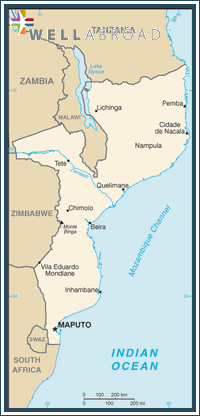|
MOST RECENT ALERTS
There's no recent alert.
|

|
|||||||||||||||
| COUNTRY OVERVIEW | ||||||||||||||||
|---|---|---|---|---|---|---|---|---|---|---|---|---|---|---|---|---|
|
| COUNTRY GENERAL INFORMATION | |||||||
|---|---|---|---|---|---|---|---|
| Language: |
Emakhuwa 26.1%, Xichangana 11.3%, Portuguese 8.8% (official; spoken by 27% of population as a second language), Elomwe 7.6%, Cisena 6.8%, Echuwabo 5.8%, other Mozambican languages 32%, other foreign languages 0.3%, unspecified 1.3% |
||||||
| Currency: | Mozambique Metical (MZM) | ||||||
| Predominant Religions: |
Catholic 23.8%, Muslim 17.8%, Zionist Christian 17.5%, other 17.8%, none 23.1% |
||||||
| National Holidays: | Independence Day, 25 June (1975) | ||||||
| Economic Status: |
Mozambique, a developing country in southern Africa, has steadily rebuilt its economy and civic institutions since ending a 16-year civil war in 1992. Despite high economic growth rates in recent years, Mozambique remains one of the world's poorest countries. |
||||||
| Security: |
Mozambique Armed Defense Forces (FADM): Mozabique Army, Mozambique Navy (Marinha Mocambique, MM), Mozambique Air Force (Forca Aerea de Mocambique, FAM) |
||||||
| US Presence: | |||||||
| Document Requirements: |
A visa is required for entry into Mozambique. It is recommended that travelers acquire the appropriate visa prior to departing for Mozambique, although a one-entry visa can be obtained at country points of entry, including airports. Foreigners in Mozambique without a valid visa can expect to pay a substantial fine (1000 meticais) for each day they are in Mozambique illegally. The fine can be assessed upon travelers’ departure or if travelers are caught by authorities while still in Mozambique. Please pay close attention to the period you are authorized to stay in Mozambique on your visa ("Autorizado a permaneçer pelo período de [number of days])." This is the maximum number of days you may stay before you must depart Mozambique. The passports of all travelers who wish to enter Mozambique must be valid for six months upon arrival and must contain at least three clean (unstamped) visa pages each time entry is sought. The Mozambican Embassy and Consulates in South Africa charge up to five times the amount charged in the U.S. or at border crossing points for a tourist visa to Mozambique. Visit the Embassy of Mozambique web site for the most current visa information. In September 2007 the Mozambican Interior and Health Ministries decreed that all travelers entering Mozambique, having previously visited a country where yellow fever is present, must present a valid certification of vaccination against yellow fever. We recommend all travelers be vaccinated to avoid complications at the border. Any passenger who cannot present such a certificate at the port of entry will be vaccinated at a cost of $50 US dollars or the equivalent in metical. Additionally, all travelers entering Mozambique must carry their yellow vaccination book. The U.S. Department of State is unaware of any HIV/AIDS entry restrictions for visitors to or foreign residents of Mozambique. Information about dual nationality or the prevention of international child abduction can be found on our website. For further information about customs regulations, please read our Customs Information page. |
||||||
| Major Airports: |
Airports: 158, Airports w/paved runways: 22 |
||||||
| Servicing Airlines: |
|
||||||
| Risks and Precautions: |
Overland travel after dark is extremely dangerous due to poor road conditions, lack of emergency services, and the increased potential for vehicle hijacking. Due to residual landmines, overland travelers are advised to remain on well-traveled roads or seek local information before going off-road outside of Maputo and other provincial capitals. The biggest threat facing U.S. citizens visiting Mozambique is violent crime. Street crimes, including mugging, purse snatching, and pick pocketing are common, both in Maputo and in secondary cities. Americans have been victims of sexual assault and armed robbery. Visitors should not walk at night, even in well-known tourist areas. |
||||||
| Mortality Statistics: |
Infant MR total: 129.24/1,000 live births Life expectancy at birth: TOTAL 39.82 years (male 39.53/female 40.13) |
||||||
| Immunization Indicators: |
Required: None Recommended: Yellow Fever, Malaria, Meningococcal (meningitis), Hep A & B, Rabies, Typhoid |
||||||
| Infectious Disease Concerns: |
Major infectious diseases: degree of risk: very high food or waterborne diseases: bacterial and protozoal diarrhea, hepatitis A, and typhoid fever Dengue, filariasis, leishmaniasis, onchocerciasis (river blindness) and Rift Valley fever are other diseases carried by insects that also occur in this region. Protecting yourself against insect bites will help to prevent these diseases. A number of rickettsial infections also occur in this region. Wearing protective clothing and avoiding rural areas or areas of dense vegetation along streams, is the best protection. Schistosomiasis, a parasitic infection, is found in fresh water in the region, including Lake Malawi. |
||||||
| Overall Quality of Medical Services: |
Medical facilities are rudimentary, and most medical providers do not speak fluent English. Medicines are not always consistently available. There are both public and private medical facilities in the city of Maputo. All health care institutions and providers require payment at the time of service, and may even require payment before service is given. While some private clinics accept credit cards, many medical facilities do not. Doctors and hospitals outside Maputo generally expect immediate cash payment for health services. Outside of Maputo, available medical care ranges from very basic to non-existent. |
||||||
| Providers in Network: |
|
||||||
| Recent Medical Threats/ Concerns/Warnings: |
Meningitis risk from Dec through June. African sleeping sickness (African trypanosomiasis), which is transmitted through the bite of an infected tsetse fly, can be found in distinct areas of East Africa. The number of cases of African sleeping sickness in travelers has increased in recent years. Polio has also resurfaced in Ethiopia since 03. Other infections that tend to occur more often in longer-term travelers (or immigrants from the region) include tuberculosis, HIV and hepatitis B. |
||||||
| Communications Info: |
Country Calling Code: +258 Internet Country Code: .mz |
||||||






